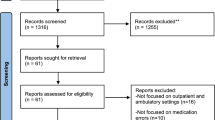Abstract
High US drug costs have garnered increasing attention, with multiple proposed reforms. While physicians are key stakeholders, medical education about drug pricing is not described, and medical students’ understanding and attitudes are poorly understood. To assess students’ awareness of drug pricing and its determinants, the authors conducted a cross-sectional, web-based survey of US medical students. Survey items included attitudes and knowledge around drug pricing and relevant education received (e.g., importance, quantity/quality of instruction). A composite knowledge score summed correct responses to 10 knowledge items. Descriptive statistics and t tests were used to evaluate associations. Among 815 viewers of the survey invitation, 361 visited the survey and 240 completed it (view rate 44%; participation rate 77%; completion rate 87%). Most participants were white (62%), in MD programs (82%), and female (53%). Nearly all (> 99%) said it was somewhat or very important to understand factors influencing drug pricing; over 90% were interested in learning more. Among year 3–4 students (n = 108), 59% reported receiving medical school instruction on pricing; few rated the quantity as adequate (7%) or the quality as excellent (3%) or good (8%). Among 10 knowledge questions, the median correct score was 6. Fewer than half (44%) knew that prices are uncorrelated with research/development costs. Knowledge was associated with year in school (p = 0.011) but not reported instructional quality or quantity. In sum, medical students report interest in drug pricing but inadequate instruction, and their knowledge is incomplete. Enhanced education is needed to equip future doctors to advocate effectively for patients around drug prices.
Similar content being viewed by others
References
Allan GM, Lexchin J, Wiebe N. Physician awareness of drug cost: a systematic review. PLoS Med. 2007;4(9):e283.
American Medical Association. “Truth in Rx (https://truthinrx.org/).” Retrieved February 11, 2020, from https://truthinrx.org/.
Antiel RM, James KM, Egginton JS, Sheeler RD, Liebow M, Goold SD, et al. Specialty, political affiliation, and perceived social responsibility are associated with U.S. physician reactions to health care reform legislation. J Gen Intern Med. 2014;29(2):399–403.
Ballreich J, Alexander GC, Socal M, Karmarkar T, Anderson G. Branded prescription drug spending: a framework to evaluate policy options. J Pharm Policy Pract. 2017;10:31.
Boerner H. Analysis: physicians can lead on drug price reform. Physician Leadersh J. 2017;4(6):54.
Daniel H, Bornstein SS; Health Public Policy Committee of the American College of Physicians. Policy recommendations for public health plans to stem the escalating costs of prescription drugs: a position paper from the American College of Physicians. Ann Intern Med. 20193;171(11):825–7.
DiMasi JA, Grabowski HG, Hansen RW. Innovation in the pharmaceutical industry: new estimates of R&D costs. J Health Econ. 2016;47:20–33.
Earnest MA, Wong SL, Federico SG. Perspective: physician advocacy: what is it and how do we do it? Acad Med. 2010;85(1):63–7.
Eysenbach G. Improving the quality of Web surveys: the Checklist for Reporting Results of Internet E-Surveys (CHERRIES). J Med Internet Res. 2004;6(3):e34.
(2019). “2019 FACTS: Applicants and Matriculants Data.” from https://www.aamc.org/data-reports/students-residents/interactive-data/2019-facts-applicants-and-matriculants-data.
Grischkan J, George BP, Chaiyachati K, Friedman AB, Dorsey ER, Asch DA. Distribution of medical education debt by specialty, 2010-2016. JAMA Intern Med. 2017;177(10):1532–5.
Harris PA, Taylor R, Thielke R, Payne J, Gonzalez N, Conde JG. Research electronic data capture (REDCap)--a metadata-driven methodology and workflow process for providing translational research informatics support. J Biomed Inform. 2009;42(2):377–81.
Harris PA, Taylor R, Minor BL, Elliott V, Fernandez M, O’Neal L, et al. The REDCap consortium: building an international community of software platform partners. J Biomed Inform. 2019;95:103208.
Kaltenboeck A, Bach PB. Value-based pricing for drugs: theme and variations. Jama. 2018;319(21):2165–6.
Kesselheim AS, Tan YT, Avorn J. The roles of academia, rare diseases, and repurposing in the development of the most transformative drugs. Health Aff (Millwood). 2015;34(2):286–93.
Kesselheim AS, Avorn J, Sarpatwari A. The high cost of prescription drugs in the United States: origins and prospects for reform. Jama. 2016;316(8):858–71.
Kirzinger A, Lopes L, Wu B, Brodie M. KFF health tracking poll – February 2019: prescription drugs. The Henry J. Kaiser Family Foundation website. https://www.kff.org/health-costs/poll-finding/kff-health-tracking-poll-february-2019-prescription-drugs/. Accessed 1 March 2019.
Saito H, Ozaki A, Sawano T, Shimada Y, Tanimoto T. Evaluation of pharmaceutical company payments and conflict of interest disclosures among oncology clinical practice guideline authors in Japan. JAMA Netw Open. 2019;2(4):–e192834.
Schulman KA, Richman BD. The evolving pharmaceutical benefits market. Jama. 2018;319(22):2269–70.
Tay-Teo K, Ilbawi A, Hill SR. Comparison of sales income and research and development costs for FDA-approved Cancer drugs sold by originator drug companies. JAMA Netw Open. 2019;2(1):e186875.
Yu NL, Helms Z, Bach P. R&D costs for pharmaceutical companies do not explain elevated US drug prices. Health Affairs Blog. 2017. http://www.healthaffairs.org/do/10.1377/hblog20170307.059036/full/. Accessed 7 March 2017.
Acknowledgments
The authors wish to thank Laura Turner, Executive Director at Student Doctor Network, for her invaluable assistance in fielding the survey.
Funding
This work was made possible by a grant from the Laura and John Arnold Foundation. This work was also supported in part from a grant to Memorial Sloan Kettering Cancer Center from the National Cancer Institute (P30 CA008748).
Author information
Authors and Affiliations
Corresponding author
Ethics declarations
Conflict of Interest
Dr. Korenstein’s spouse serves on the Scientific Advisory Board of Vedanta Biosciences and provides consulting for Takeda. No other authors have conflicts of interest to report.
Ethical Approval
The study was deemed exempt by the authors’ institutional IRB.
Disclaimers
None.
Additional information
Previous Presentations
None.
Publisher’s Note
Springer Nature remains neutral with regard to jurisdictional claims in published maps and institutional affiliations.
Rights and permissions
About this article
Cite this article
Korenstein, D., Kaltenboeck, A., Mamoor, M. et al. Priceless Knowledge: Attitudes and Awareness Around Drug Pricing Among US Medical Students. Med.Sci.Educ. 31, 489–494 (2021). https://doi.org/10.1007/s40670-020-01190-x
Accepted:
Published:
Issue Date:
DOI: https://doi.org/10.1007/s40670-020-01190-x




